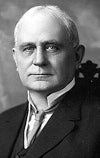
After James E. Morrow left, the Board of Regents hired James Beauchamp Clark in 1873, a recent graduate of Bethany College, West Virginia. In his application Clark wrote, “I have just graduated from Bethany College with highest honors; am twenty-three years old, over six feet high, weigh one hundred and seventy pounds, unmarried, am a Kentuckian by birth, a Campbellite in religion, a Democrat in politics, and a Master Mason.” At twenty-three, he was not much older than some of his students. When faced with a hazing incident by four students, one of whom refused to apologize, Clark gave him the option of apologizing, of being expelled, or he said, “I will thrash you with an inch his life.” The cowed student apologized, and he had “no more trouble in maintaining discipline.” During his tenure the College’s enrollment fell to only seventy students. Coupled with this lack of success and with his high disgust at the West Virginia Legislature’s failure to pay the teachers’ salaries, he left after one year to pursue a career in law.
James B. Clark, the son of John H. Clark and Aletha Jane (Beauchamp) Clark, was born on March 7, 1850, at Lawrenceburg, Kentucky. As a youth, he worked as a hired hand and in a county store, saving his money so that he could attend college. In 1867 he entered the University of Kentucky, attending three years without incident, when he was expelled in his mid-senior year for shooting a gun at a fellow student. Years later he still remained unrepentant, “I fired and missed, a friend knocking the pistol upward as I pulled the trigger. Looking back, I feel that I was not censurable.” He transferred to Bethany College, where he graduated with bachelors of arts in 1873, delivering the Latin salutatory.
After a year as Marshall College’s Principal, he entered the Cincinnati Law School, graduating with his LL.B. degree in 1875. He moved to Wichita, Kansas, to open a law office, but found himself nearly penniless instead. He heard of a teaching opportunity in Louisiana, Missouri, where he applied and was hired as the principal of the local high school. He stayed only one year. It was his last teaching job, and in retrospect he said that “his school teachings days were his happiest.”
In 1876 he passed the Missouri bar and began to practice law, but few clients showed up. He took on editing a local newspaper, the Louisiana Daily News, to help pay the bills, which introduced him to state politics. His first foray into the political arena occurred in 1878, when he ran for the state legislature, but was defeated. He purchased the Riverside Press in 1879, turning the independent newspaper in a pure Democratic organ, editing it until late 1880. That year he moved to Bowling Green, Pike County, Missouri, which became his permanent home, in order to take a position as the assistant city attorney. He was elected as the city attorney in 1884, where he worked until 1889. During his tenure he tried over 2,000 cases
In Bowling Green he met and married twenty-two-year-old Genevieve Davis Bennett on December 14, 1881. They had four children. One son, Joel Bennett Clark, like his father, served in the U. S. House of Representative from 1933 to 1945.In 1889 and 1891 he was elected to the Missouri State House of Representatives. In 1892 he was elected to the U. S. House of Representatives, in which he served continually, except in the 1894 election when he lost. He was reelected 1897, remaining in the house until his death. In 1908 he was elected as the Democratic minority leader. In 1911 he was elected the Speaker of the House when the Democrats took over that Chamber. He served in that position until 1919, when he lost the position, becoming the minority leader, in the Republican landslide of 1920. He died in his home in Washington, D.C., on March 2, 1921, just two days before the expiration of his final House term. His funeral services were held in the Statuary Hall of the House of Representatives. He was buried in the City Cemetery, Bowling Green, Missouri.
Principals
- Isaac N. Peck, 1837-1839
- Jacob H. Patton, 1839- 1840
- Alfred E. Thom, 1840-1843
- Josiah B. Poage, 1843-1850
- Henry Clark and Joseph Foster, 1850
- William B. McFarland, 1850-1853
- Staunton V. Field, 1853-1854
- William R. Boyers, 1854-1858
- Benjamin H. Thackston, 1858-1861
- Rev. J. M. Brown, 1861
- Daniel W. Thrush, 1861
- Salina C. Hite Mason, 1863-1867
Presidents
- Stewart Harold Smith, 1961-1968
- Roland Hill Nelson, Jr., 1968-1970
- Donald Newton Dedmon, 1970-1971
- John Grove Barker, 1971-1974
- Robert Bruce Hayes, 1974-1983
- Sam Edward Clagg, 1984
- Dale Frederick Nitzschke, 1984-1990
- Alan Brant Gould, 1990-1991
- James Wade Gilley, 1991-1999
- Audy Michael Perry, 1999-2000
- Daniel Duane Angel, 2000-2005
- Michael Joseph Ferrell, 2005
- Stephen James Kopp, 2005 – 2014
- Gary G. White, 2014 – Jan 2016
- Jerome A “Jerry” Gilbert, 2016 – present
Bibliography With Source Notes
Created by Lisle Brown, former Curator Special Collections